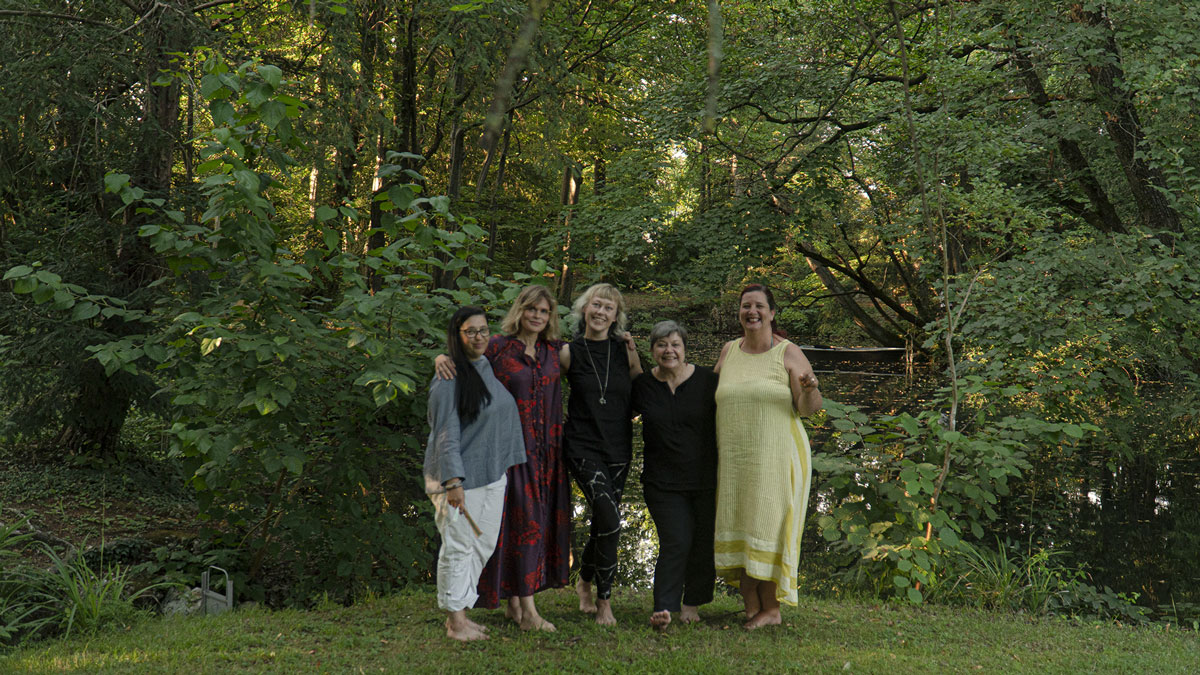
The Traveling Plant Seed Team, image Pavel Tavares, July 2020
Hosting The Traveling Plant
Common Ground and Free Variations
Seeding Instructions for Hosting Organisations & Curators (main guidelines)
The Traveling Plant project is the umbrella title for a series of new artworks and events created and taking place in different times and locations around the world under the direction of different participating host organisations and curators. The project will be unfolding over several years, in a slow process.
> The Traveling Plant project has been seeded and germinated by Annick Bureaud, Tatiana Kourochkina, Marta de Menezes, Claudia Schnugg and Robertina Šebjanič. They constitute the Seed Team and run the project collectively.
> An “imaginary” plant: the project is open to actual plants, existing, invasive, proliferating, endangered or extinct; to fictitious and imaginary plants; to artificial plants, robotics, digital or otherwise; to organic or GMO plants; and any other sorts we may have not thought about. Under the word “plant”, when actual, we understand terrestrial, aquatic and underwater plants of any sorts and size including fungi and algae.
> The Traveling Plant project is working with a network of organizations and/or curators which constitute “host organizations” that become steps along the travel route of the Traveling Plant.
> The Traveling Plant project is working with the hosting organisations and/or curators, not directly with the artists.
> Each participating host organisation/curator is free to commission the artist(s) it would like to work with and the process by which the artist(s) will be selected. All the artists get a fee, even a small one, for their work.
> An event will be organised in each location by the host organisation and/or curator. It can be part of a larger event. This event and artistic commission will become each place’s “incarnation” of The Traveling Plant project and connect to the overall framework.
> Cross gardening: when possible and with a great attention paid to local plants, real plants will be planted along the development of the project in the locations of the different participating organisations.
More information for future hosts
> All sorts of events formats are possible (performances, telling stories, exhibitions, workshops, lectures, screenings, artist residency, gardening, etc.); meant for all kinds of audiences, small or large.
> Each artist proposes his/her vision of the imaginary plant. The form of the artwork can encompass all kinds of aesthetics, topics, formats and mediums, analog, digital, biotechnological, and more.
> Each participating host organisation designs what is meaningful in its context and in the language(s) which is the most appropriate but contributes to the general project, to the shared tangible outcome and to the common website. The route, a shared collection of representations online and physical tokens of each stop of the Traveling Plant, will be central to the common outcome.
> Each hosting organisation and/or curator is responsible for fundraising for its own activity related to/within The Traveling Plant project. However, whenever possible joint and/or collective applications will be put together. Leonardo/Olats nor any member of the Seed Team or their respective institutions cannot be financially liable for any of the hosting organisations and/or curators, nor for any law infringement or copyright issues from any participating organizations and/or curators and artists.
If you are an organisation or a curator interested in becoming a host to the Traveling Plant, send us an email of intent (with your location, intended/possible timeline, and scope) to travelingplant20 AT gmail.com and copy all the members of the team that you may know.
We are processing the project in a deliberate slow pace and will come back to you with more details.
Partners
The Traveling Plant is a collective project created in 2020 by Annick Bureaud, Tatiana Kourochkina, Marta de Menezes, Claudia Schnugg and Robertina Šebjanič, and further developed with the following seed organisations Leonardo/Olats (Paris), Quo Artis (Barcelona and Treviso), Cultivamos Cultura (Lisbon), Sektor Institute (Ljubljana) and the initial support of the Daniel and Nina Carasso Foundation.

Leonardo/Olats
Observatoire Leonardo des Arts et des Techno-Sciences
À propos / About | Lettre d'information Olats News



Pour toute (re)publication, merci de contacter / For any (re)publication, please contact Annick Bureaud: info@olats.org
Pour toute question concernant le site, merci de contacter / For any issue about the website, please contact: webmaster@olats.org
Design Thierry Fournier
© Association Leonardo 1997-2022